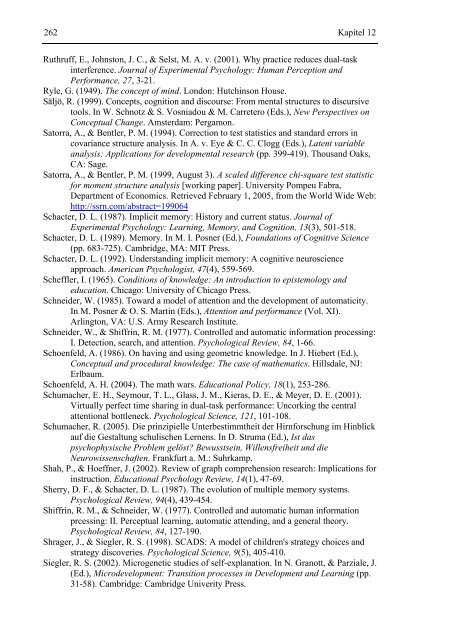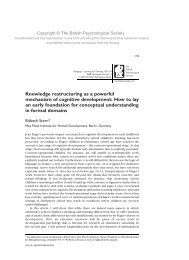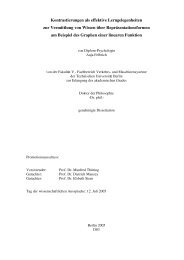Konzeptuelles und prozedurales Wissen als latente Variablen: Ihre ...
Konzeptuelles und prozedurales Wissen als latente Variablen: Ihre ...
Konzeptuelles und prozedurales Wissen als latente Variablen: Ihre ...
Erfolgreiche ePaper selbst erstellen
Machen Sie aus Ihren PDF Publikationen ein blätterbares Flipbook mit unserer einzigartigen Google optimierten e-Paper Software.
262 Kapitel 12<br />
Ruthruff, E., Johnston, J. C., & Selst, M. A. v. (2001). Why practice reduces dual-task<br />
interference. Journal of Experimental Psychology: Human Perception and<br />
Performance, 27, 3-21.<br />
Ryle, G. (1949). The concept of mind. London: Hutchinson House.<br />
Säljö, R. (1999). Concepts, cognition and discourse: From mental structures to discursive<br />
tools. In W. Schnotz & S. Vosniadou & M. Carretero (Eds.), New Perspectives on<br />
Conceptual Change. Amsterdam: Pergamon.<br />
Satorra, A., & Bentler, P. M. (1994). Correction to test statistics and standard errors in<br />
covariance structure analysis. In A. v. Eye & C. C. Clogg (Eds.), Latent variable<br />
analysis: Applications for developmental research (pp. 399-419). Thousand Oaks,<br />
CA: Sage.<br />
Satorra, A., & Bentler, P. M. (1999, August 3). A scaled difference chi-square test statistic<br />
for moment structure analysis [working paper]. University Pompeu Fabra,<br />
Department of Economics. Retrieved February 1, 2005, from the World Wide Web:<br />
http://ssrn.com/abstract=199064<br />
Schacter, D. L. (1987). Implicit memory: History and current status. Journal of<br />
Experimental Psychology: Learning, Memory, and Cognition, 13(3), 501-518.<br />
Schacter, D. L. (1989). Memory. In M. I. Posner (Ed.), Fo<strong>und</strong>ations of Cognitive Science<br />
(pp. 683-725). Cambridge, MA: MIT Press.<br />
Schacter, D. L. (1992). Understanding implicit memory: A cognitive neuroscience<br />
approach. American Psychologist, 47(4), 559-569.<br />
Scheffler, I. (1965). Conditions of knowledge: An introduction to epistemology and<br />
education. Chicago: University of Chicago Press.<br />
Schneider, W. (1985). Toward a model of attention and the development of automaticity.<br />
In M. Posner & O. S. Martin (Eds.), Attention and performance (Vol. XI).<br />
Arlington, VA: U.S. Army Research Institute.<br />
Schneider, W., & Shiffrin, R. M. (1977). Controlled and automatic information processing:<br />
I. Detection, search, and attention. Psychological Review, 84, 1-66.<br />
Schoenfeld, A. (1986). On having and using geometric knowledge. In J. Hiebert (Ed.),<br />
Conceptual and procedural knowledge: The case of mathematics. Hillsdale, NJ:<br />
Erlbaum.<br />
Schoenfeld, A. H. (2004). The math wars. Educational Policy, 18(1), 253-286.<br />
Schumacher, E. H., Seymour, T. L., Glass, J. M., Kieras, D. E., & Meyer, D. E. (2001).<br />
Virtually perfect time sharing in dual-task performance: Uncorking the central<br />
attentional bottleneck. Psychological Science, 121, 101-108.<br />
Schumacher, R. (2005). Die prinzipielle Unterbestimmtheit der Hirnforschung im Hinblick<br />
auf die Gestaltung schulischen Lernens. In D. Struma (Ed.), Ist das<br />
psychophysische Problem gelöst? Bewusstsein, Willensfreiheit <strong>und</strong> die<br />
Neurowissenschaften. Frankfurt a. M.: Suhrkamp.<br />
Shah, P., & Hoeffner, J. (2002). Review of graph comprehension research: Implications for<br />
instruction. Educational Psychology Review, 14(1), 47-69.<br />
Sherry, D. F., & Schacter, D. L. (1987). The evolution of multiple memory systems.<br />
Psychological Review, 94(4), 439-454.<br />
Shiffrin, R. M., & Schneider, W. (1977). Controlled and automatic human information<br />
prcessing: II. Perceptual learning, automatic attending, and a general theory.<br />
Psychological Review, 84, 127-190.<br />
Shrager, J., & Siegler, R. S. (1998). SCADS: A model of children's strategy choices and<br />
strategy discoveries. Psychological Science, 9(5), 405-410.<br />
Siegler, R. S. (2002). Microgenetic studies of self-explanation. In N. Granott, & Parziale, J.<br />
(Ed.), Microdevelopment: Transition processes in Development and Learning (pp.<br />
31-58). Cambridge: Cambridge Univerity Press.





